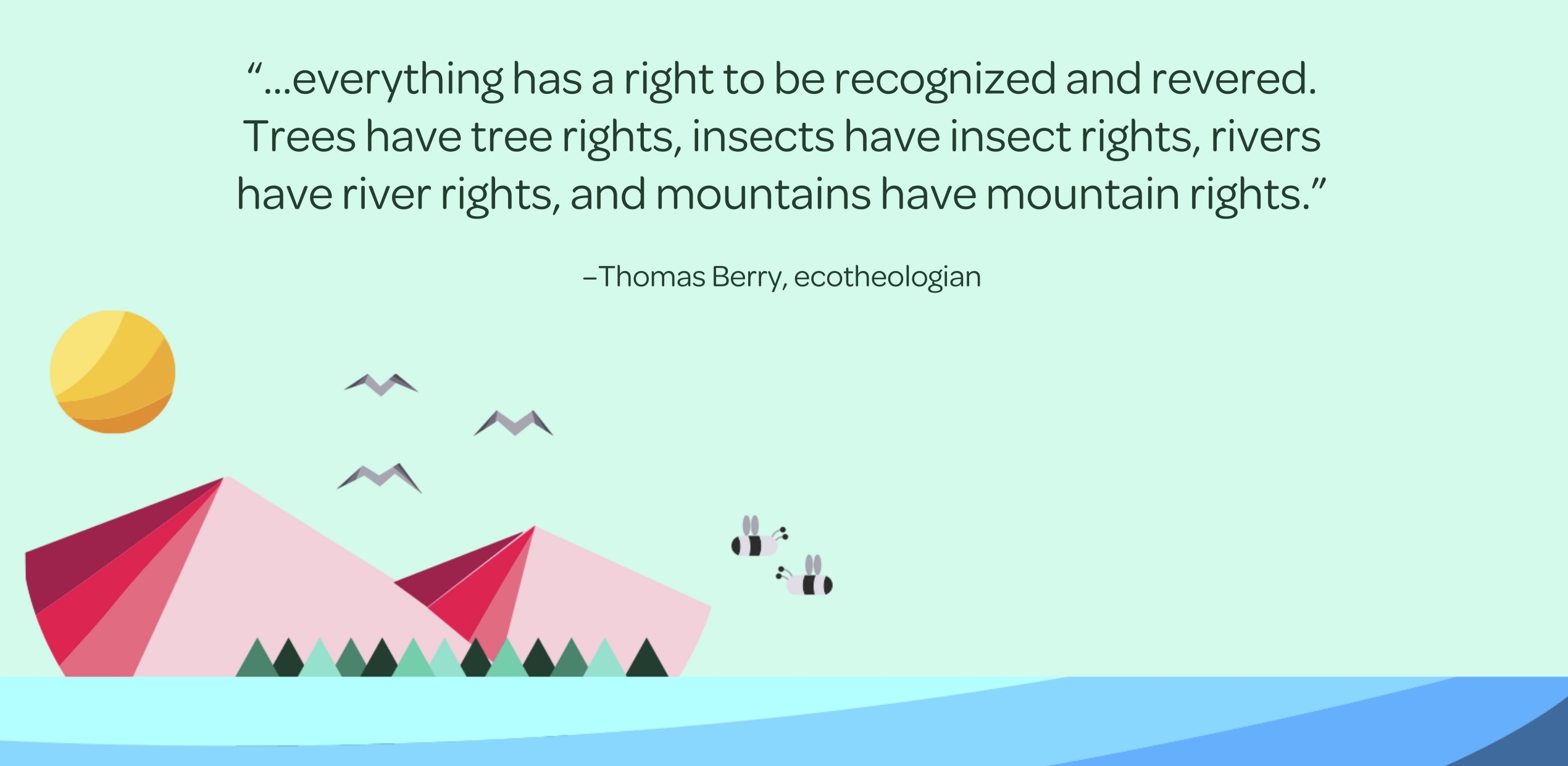ETHOS
A core value set must be at the heart of a PPP approach.
What we value as a society also needs to be what is of true value to the Earth.
A core value set must be at the heart of a PPP approach.
What we value as a society also needs to be what is of true value to the Earth.

Planet-Centered Design
Modern conservation approaches and learning from nature are also not enough, and neither are current approaches to sustainable innovation that focuses on creating ‘less bad’ products and services, rather than positive innovations that are focused on re-generative development. Collaborations for sustainable innovations are almost always human-centric rather than planet-centric and therefore ‘solutions’ often miss out on the opportunity to integrate natural capital as an innovation partner, and later become the cause of more problems.
Our institutions, cities, innovations and frameworks need to be designed in a way that creates ecosystem services that contribute to Earth’s well being. You can download our planet-centered design toolkit here.

Planet-Centered Design
Modern conservation approaches and learning from nature are also not enough, and neither are current approaches to sustainable innovation that focuses on creating ‘less bad’ products and services, rather than positive innovations that are focused on re-generative development. Collaborations for sustainable innovations are almost always human-centric rather than planet-centric and therefore ‘solutions’ often miss out on the opportunity to integrate natural capital as an innovation partner, and later become the cause of more problems.
Our institutions, cities, innovations and frameworks need to be designed in a way that creates ecosystem services that contribute to Earth’s well being. You can download our planet-centered design toolkit here.


Regenerative Development
The PPP concept propagates the idea that the earth can be healed and regenerated through human development. This recognition comes from the understanding that humans have always developed the places they’ve inhabited, and that many cultures throughout history have had symbiotic and sophisticated partnerships with the land, that are viewed as mutually enhancing. Our goal is to rekindle this wisdom, integrate it into the evolutionary insights of modern science, and apply it to social innovation and development.
Regenerative Development
The PPP concept propagates the idea that the earth can be healed and regenerated through human development. This recognition comes from the understanding that humans have always developed the places they’ve inhabited, and that many cultures throughout history have had symbiotic and sophisticated partnerships with the land, that are viewed as mutually enhancing. Our goal is to rekindle this wisdom, integrate it into the evolutionary insights of modern science, and apply it to social innovation and development.

Nature Needs Our Collaboration
The natural world is our biggest social and economic partner, yet we don’t actively forge collaborations with other species. We don’t leverage nature’s open source innovations. We don’t form trade deals with microbial communities. We don’t develop relationships with other ecosystems. We don’t form consortia with our forests, nor coalitions with our oceans.

Nature Needs Our Collaboration
The natural world is our biggest social and economic partner, yet we don’t actively forge collaborations with other species. We don’t leverage nature’s open source innovations. We don’t form trade deals with microbial communities. We don’t develop relationships with other ecosystems. We don’t form consortia with our forests, nor coalitions with our oceans.


En-clusivity
En-clusivivity: Environmentally Inclusive.
Throughout history humans have colonized, enslaved, and marginalized peoples and nations. Our economically exploitative relationship with nature has followed this trajectory, with potentially fatal and irreversible consequences for the human race i.e. climate change related natural disasters, death, diseases, displacement; resource scarcity (water, food etc.).
Just as we are ending colonialism and are transitioning to an era of international relations and cooperation–recognizing our sameness over our separateness–we must view ourselves as a part of nature and usher in an age of interspecies relations with the nonhuman natural world.
Instead, we are ignoring–and even destroying–it. While the profit from destroying nature is almost always privatized, the cost is almost always socialized. Rather than using our disproportionately large influence and effect on nature for our long-term sustainability and regeneration, we are accelerating our own extinction for short-term economic growth and stability.
Paradoxically, if one considers how advancing gender equality to its full potential could add USD 28 trillion to world GDP growth by 2025 – about the equivalent of the Chinese and U.S. economies combined—how many trillions are we losing in economic, social and ecological opportunities by not being “en-clusive”.
En-clusivity
En-clusivivity: Environmentally Inclusive.
Throughout history humans have colonized, enslaved, and marginalized peoples and nations. Our economically exploitative relationship with nature has followed this trajectory, with potentially fatal and irreversible consequences for the human race i.e. climate change related natural disasters, death, diseases, displacement; resource scarcity (water, food etc.).
Just as we are ending colonialism and are transitioning to an era of international relations and cooperation–recognizing our sameness over our separateness–we must view ourselves as a part of nature and usher in an age of interspecies relations with the nonhuman natural world.
Instead, we are ignoring–and even destroying–it. While the profit from destroying nature is almost always privatized, the cost is almost always socialized. Rather than using our disproportionately large influence and effect on nature for our long-term sustainability and regeneration, we are accelerating our own extinction for short-term economic growth and stability.
Paradoxically, if one considers how advancing gender equality to its full potential could add USD 28 trillion to world GDP growth by 2025 – about the equivalent of the Chinese and U.S. economies combined—how many trillions are we losing in economic, social and ecological opportunities by not being “en-clusive”.

Rights of Nature
We lack a universally accepted ethical and legal framework for the rights of nature that redefines our relationship with the millions of other species and ecosystems on the planet. We overlook the need for nonhuman-centered design that embraces nature within our sphere of empathy.
Moreover, just as we map human stakeholders, we need to map nonhuman stakeholders to align our mutual interests. We need a legal framework that contractually protects the rights of nature so that the planet cannot be exploited in a PPP, and has a legal recourse in the event that those rights are breached. You can download our “Rights of Nature” Tool here.

Rights of Nature
We lack a universally accepted ethical and legal framework for the rights of nature that redefines our relationship with the millions of other species and ecosystems on the planet. We overlook the need for nonhuman-centered design that embraces nature within our sphere of empathy.
Moreover, just as we map human stakeholders, we need to map nonhuman stakeholders to align our mutual interests. We need a legal framework that contractually protects the rights of nature so that the planet cannot be exploited in a PPP, and has a legal recourse in the event that those rights are breached. You can download our “Rights of Nature” Tool here.


Nature is an Entrepreneurial System
Nature is an entrepreneurial system that has been conducting research and development for billions of years. The cost equivalent of human beings conducting that same research is incomparable however we are ignoring it and even destroying it. Current development in science and technology has been struggling in conserving biodiversity, and in matching some of nature’s innovations and patents, and even more in integrating the environment as part of our technical systems.
We must ask how we can form mutualistic and symbiotic collaborations with the natural world, which has proven to have more far more skilled environmental engineers, architects, green chemists and system designers than humans.
Nature is an Entrepreneurial System
Nature is an entrepreneurial system that has been conducting research and development for billions of years. The cost equivalent of human beings conducting that same research is incomparable however we are ignoring it and even destroying it. Current development in science and technology has been struggling in conserving biodiversity, and in matching some of nature’s innovations and patents, and even more in integrating the environment as part of our technical systems.
We must ask how we can form mutualistic and symbiotic collaborations with the natural world, which has proven to have more far more skilled environmental engineers, architects, green chemists and system designers than humans.

